One of the hottest topics of debates between air gunners is the power source behind the pellet. The three main sources are spring power, Compressed CO2 gas, and Compressed air (PCP). One of our resident airgun experts, Jason Whittle, ways up the advantages and disadvantages….
The three main power sources available in airgunning are at the heart of all air rifles and air pistols of all different shapes and sizes, but ultimately they all do the same thing, which is to fire lead pellets or BBs. There are advantages and disadvantages to all of them, as there are with petrol, diesel, and electric cars, for example. Ultimately it comes down to what is best for you, and what you’re going to be using it for, but hopefully the information in this post will help you with that decision.
Spring Power
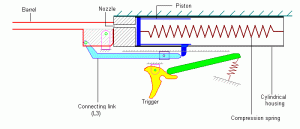
The diagram here shows how a spring rifle works and what components it consists of inside. Spring rifles are the simplest of the three power methods available to airgunners, thanks to the low number of moving parts and absence of high pressure seals and valves etc. This makes spring rifles the most reliable out of the three types of power plant.
Some advantages to the spring powered system are that it doesn’t require any gas or refills when shooting, just a person to cock and load it, and it’s ready to go. This is ideal in a hunting situation, when carrying spare gas or a diving bottle isn’t really an option. Spring rifles aren’t affected by changes in temperature like gas powered rifles, are which means you know that it’ll be just as powerful on a cold day as it is a warm day.
There are of course disadvantages. Spring rifles do have recoil when shot, some more than others, and while this can be reduced with tuning kits and polishing, it can’t be completely eliminated. Springers can also be quite noisy when shot, as the noise of the piston moving at a great speed then abruptly stopping is loud. This can’t be helped. The muzzle crack can be suppressed with the fitting of a moderator, but most of the time the difference isn’t very noticeable.
Over time, springers do suffer from spring fatigue, as the metal spring loses its springiness over time, and becomes tired, causing a drop in power. However, this can be easily remedied with a service and a replacement spring, which is often relatively inexpensive.
If you’re looking for a hassle free rifle which will work when you want to, with plenty of power, then a spring rifle is for you. They are often referred to as ‘workhorses’, as they just keep going, and in my opinion, it’s best to start with a spring rifle to learn how to shoot with the recoil, as that is an art in itself.
In terms of picking the best spring air rifle, there are a host to choose from, and the Weihrauch HW95k, and Air Arms TX200 are often mentioned.
CO2 Power
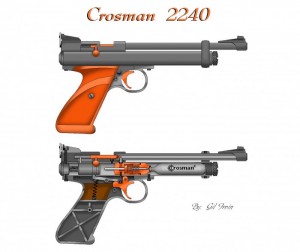
Co2 air rifles and air pistols can be powered by either of the standard capsule sizes which are the 12g Capsule, as first introduced by Crosman, or the 88g Capsule that is commonly used on paintball guns. As you can see in the diagram opposite, the insides consist of a gas chamber where the co2 sits, or attaches, which then goes through a valve, which is knocked by a hammer to release the gas through to the barrel on each shot.
Advantages to the Co2 system include the absence of recoil. As there’s no large inertia of the kind to be found in the spring rifle, when the trigger is pulled, the hammer travels about an inch forward to strike the valve and that is it. This absence of recoil helps you keep your aim and hit your target as your hand is not being moved by this force, whilst the pellet is travelling down the barrel. Another advantage is the quietness of the actions. Most of the noise that comes from a Co2 gun is caused by the co2 gas and pellet escaping the barrel at great speed, so fitting a silencer can often make these guns near silent. CO2 systems are often bolt action, or in pistols they can be semi auto, so this permits a multi-shot system that means you can fit in a follow up shot a lot quicker than you could do with a spring rifle. Co2 pistols are also great fun in semi auto format as the projectiles come out the barrel as quick as you can pull the trigger so target shooting or plinking is always a blast.
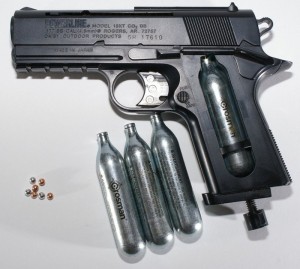
Disadvantages of this system is that temperature can massively affect the performance of these guns, which in England, with our cold winters and hot summers, can be a real problem! This difference can sometimes be a foot pound of energy or so, but it does depend on what gun it is. The number of shots also decreases on a cold day which can be a real problem when you’re on a hunting trip or shooting at a competition, and you forget to account for the change in temperature. As the co2 capsule in the gun is used the pressure decreases until it runs out which can be a problem as the pellet velocity drops, as does the point of impact, so if you don’t realise that the co2 is running out, you can totally miss what you’re aiming for very easily.
PCP Power
PCP airguns are very similar to Co2 guns in that the air is held in a reservoir, and then released through a hammer and valve system. Examples include the Walther Rotex RM8 and the BSA Scorpion SE. The difference between CO2 and air is the compressed air is held at a much higher pressure than the Co2 is. Co2 on average is around 800 PSI, whereas PCP Rifles work on around 2900 PSI, so more than 3 times the pressure! This massive increase in pressure means that the compressed air gives the pellet a very quick push, opposed to Co2 providing a very slow push which in turn leads to better shot to shot consistency and accuracy.
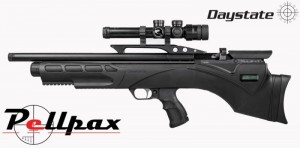
Other advantages of PCP are that the pressurised air isn’t affected by changes in temperature like Co2 capsules are. This is mandatory when in a serious shooting situation, whether it is hunting or target shooting as each shot counts. A PCP rifle’s power output is normally higher and much more stable than a CO2 weapon, as the rifles themselves are of better construction, and sometimes incorporate regulators, which increase the consistency even further. Accuracy is also phenomenal on the PCP rifles as high quality barrels and materials are used, and it is quite easy to put pellet on pellet.
As with Co2 power, suppressors can be fitted, which make most of the PCP rifles whisper quiet, and most of them feature multi-shot magazines, which are indexed through a bolt action or side lever action system making them a joy to shoot.
Disadvantages to the PCP system include the expensive set up costs. The rifles themselves start from around £380, then either a stirrup pump or a dive bottle are needed to recharge the reservoir. The dive bottle then needs to be refilled when they get low which is normally around £5 at a dive shop, although this is a small price to pay for the accuracy achieved. Other disadvantages are that there are a large number of seals within a PCP rifle, and for the most of the time they are hassle free, but over time they do perish and cause leaks, requiring a service. However, these regular services alleviate any down time.
Roundup
Which one you choose is really your decision at the end of the day, but if you’re looking for a rifle which you will shoot occasionally for either pest control/hunting, and the odd bit of casual target shooting and plinking, then a Springer will be the best choice for you, as they are rugged and reliable.
A Co2 will be a step up from a springer for a similar job, although they are really more suited towards smaller pest/vermin control and casual target shooting and not up to hunting due to the fluctuations in power.
If you’re going to be using an air rifle a lot for hunting, and competitive target shooting, then a PCP is the way to go. A good PCP can last 10 years or more if looked after, and the refills are a small price to pay for the accuracy and quality that a PCP delivers.
You can check out our range of spring powered air rifles, Co2 Powered air rifles, and PCP powered air rifles in our airgun store. Unlike most online retailers, we can deliver these direct to your door!

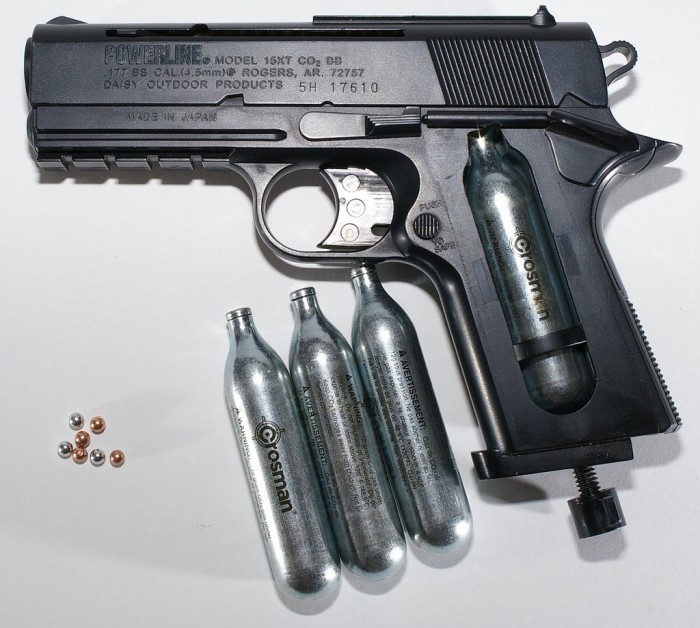
I am interested in purchasing an Air Arms TX200 with scope for varmit control.